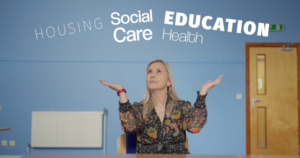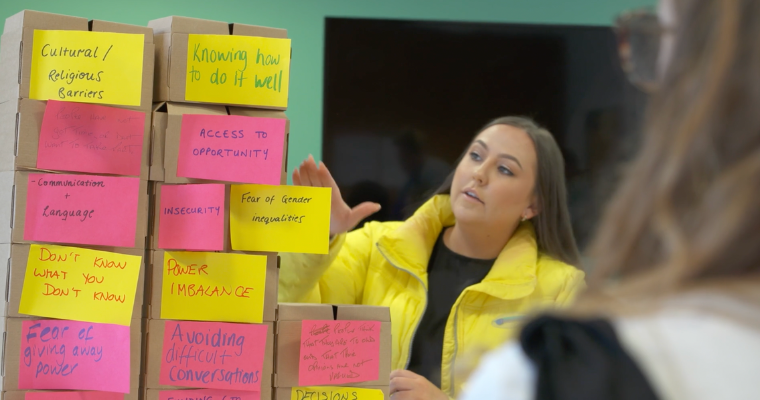
Hello Jenny. First of all, what is co-production?
Co-production brings together those who provide health and social care services and those who receive those services. This is so they can improve services by making decisions and coming up with solutions together.
At its heart, co-production is about building relationships and developing trust so that an open, honest and transparent environment can be established. This encourages people to dream, think big, push boundaries and think of new and innovate ways of working that benefit all.
It works by re-balancing power structures to create a level playing field for minds to meet, discuss and share experiences. This can help to overcome issues, problems or barriers that may exist.

Is co-production easy for people to understand?
Co-production is widely spoken about in health and social care, but its meaning can sometimes be confusing and ambiguous.
If we are to co-produce effectively, it’s important the language and explanation used means something to the communities we directly work with.
By working with people with lived experiences, in addition to health and social care professionals, we have created our own definition for co-production.
This gives us a good platform to start co-producing.
Our definition is:
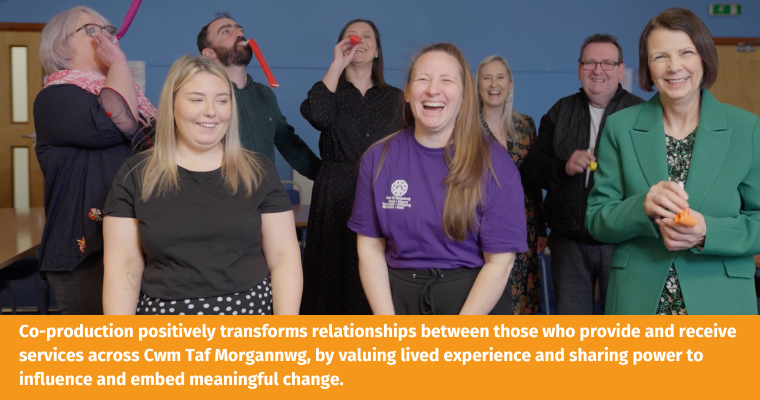
How is co-production different to community engagement?
Co-production is a form of community engagement. Community engagement is not a singular thing – it lends itself to different forms of activities and processes that involve community members, and people with lived experiences in different ways.
Different forms of community engagement can be distinguished by power dynamics. We need to ask ourselves who is setting the agenda, or whose agenda is satisfied through the completion of the activity.
For example, some of the most popular forms of community engagement are consultation and participation.
While we can’t say these forms of engagement are co-production, sometimes they can be the right way to engage with communities, and then co-production can come in at another stage.
It is entirely dependent on the desired outcome of the approach.
Consultation
In consultation, often service providers or professionals set the agenda or piece of work. The community members can then help to inform the outcomes as a respondent – there is little room for them to be involved in the initial design of the consultation.
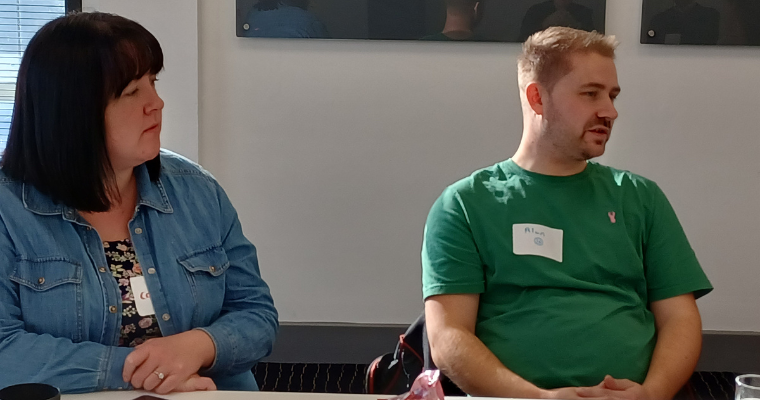
Participation
In participation, community members can have an element of influence over the direction of the piece of work. However, similarly to consultation that piece of work is usually steered by service providers and professionals.
Participation often appears in the singular, a one off event, a focus group or a set series of focus groups or meetings.
Ultimately participation has an element of definition or boundaries. This reduces the opportunity for the overall process to be shaped by the ideas, experiences and needs of community members. As a result participation has runs the risk of becoming tokenistic.

Co-production
As we move into the realms of co-production then, the big difference for me is that this is a process whereby we don’t just look to engage community members, but also a wealth of diverse service providers or professionals within a service to interrogate a challenge, issue or barrier from a range of perspectives.
It is not simply a process that is informed or influenced by community members, but rather a process that is designed with them, alongside their service provider counterparts in an environment of equity and shared power.
Done well, co-production takes time because it is a journey of multiple touch points for individuals (both community members and professionals) to get involved when and how it suits them best. It is about valuing everyone’s stories and experiences and placing them at the centre of the work and using them to explore, experiment and test ideas and solutions together.
One analogy I often use to help me remember the difference between community engagement and co-production, and to help me analyse the activities I am running so that I can identify what I am doing, is this:
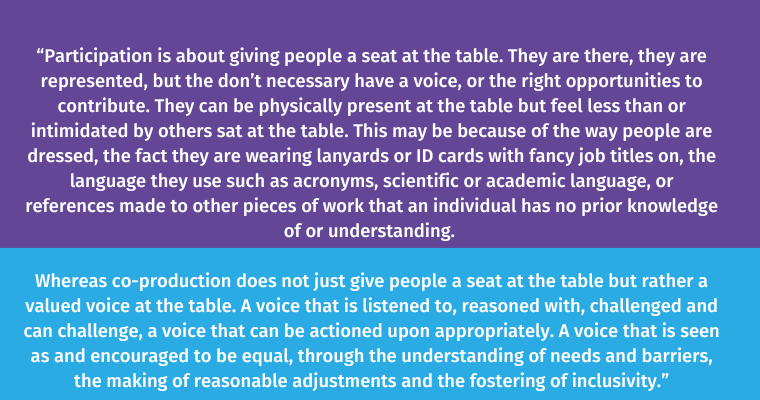
Why do we need a regional co-production definition?
Here in Cwm Taf Morgannwg we believe that co-production is the right way to work to improve our health and social care services.
There are many definitions of co-production that already exist, and we could have chosen to simply adopt something that was already out there.
However, we had an opportunity to test a potential framework for working effectively together, and develop a foundation for future strategic co-production.
The aim of our co-produced definition is to bring people together, so we can effectively deliver co-production practices across the region.
We want to encourage people with lived experiences to want to be part of our service transformation journey. We can do this by building trust through meaningful and innovative engagement, that reduces duplication and consultation fatigue across our communities.

Why was it decided to create a definition for co-production?
The need for a co-produced definition of co-production was first raised through the Phase One findings of the Our Voice Matters project in April 2020, whereby five regional recommendations were proposed to help in the embedding of co-production across the region.
However, work towards implementing these recommendations was postponed due to the COVID-19 pandemic and its lasting impact on our health and social care services.
In September 2021, the Our Voice Matters project released its Phase Two report providing insight into our regional co-production journey through the COVID-19 pandemic.
In this report, the project built upon the original five regional recommendations to propose an updated list of six recommendations based on learning from the previous 18 months. These six regional recommendations were:

What was involved in creating the definition?
Our journey to implement the first of these recommendations was to develop our co-produced definition in September 2022 at our Co-producing Co-production hackathon event.
This event saw over 60 people from across our region (a mixture of service providers and people with lived experiences) to come together to explore what the term co-production meant to them and their personal aspirations for regional co-production practices in the future.
In addition, and to help attendees think more widely about the term, individuals explored co-production through the five senses thinking about what co-production looked like, felt like, sounded like, tasted like and smelt like.
All information gathered through this event was then collated and presented to a smaller, self-referred co-analysis team of 15 individuals who examined all of the thoughts and ideas that people had offered at the Co-producing Co-production hackathon.
Through a series of activities they identified commonalities of words, meaning and intention to co-design the finalised regional definition of co-production.
We then undertook a series of sense checking activities, providing opportunity for more people to feed in and be part of the process, until final approval was sourced from the Regional Partnership Board who have since approved adoption of this definition.
In total 183 individuals from across the Cwm Taf Morgannwg region we involved in the development of this definition which was officially launched on Friday 19th May 2023 as part of Co-production Week Wales.

What happens next?
The next stage of our journey centres around promotion of the regional definition and encouraging service providers and professionals to adopt it. We also want to empower people with lived experiences across our region to hold services accountable to it.
As part of these promotional activities we will also be looking to expand our co-analysis team to commence work on implementing the second of the regional recommendations by co-creating and co-designing a co-production charter or contract.
This aims to establish our regional values that underpin co-production and our definition, to help both service providers and people with lived experience to be able to identify relevant behaviours and actions through the engagement process. This will allow us to say whether or not co-production has taken place and ensure that it is meaningful.
Once complete the co-production charter, alongside the definition will form the foundation of our regional co-production strategy, which we envision will be developed in 2024/2025.
It will also provide the framework for a regional community of practice, as outlined in regional recommendation three, to operate and expand the impact of our co-production practices in the future.
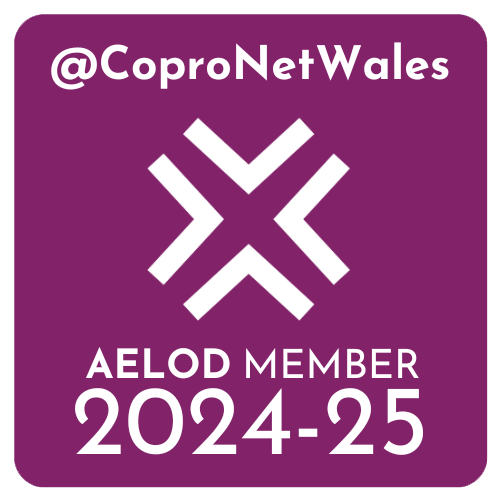
We are proud to be members of
Co-Production Network for Wales.
We are proud to be members of
Co-Production Network for Wales.

